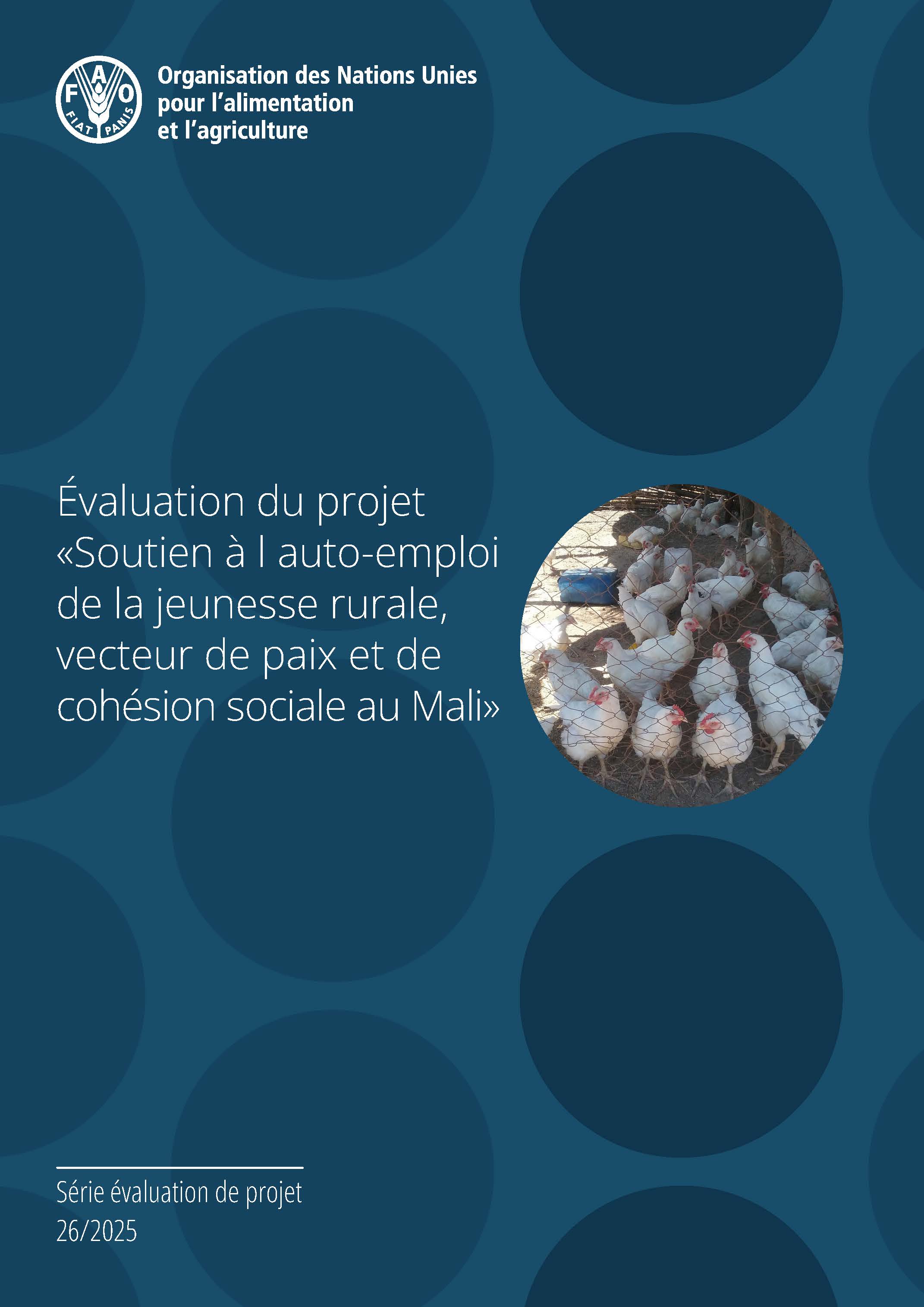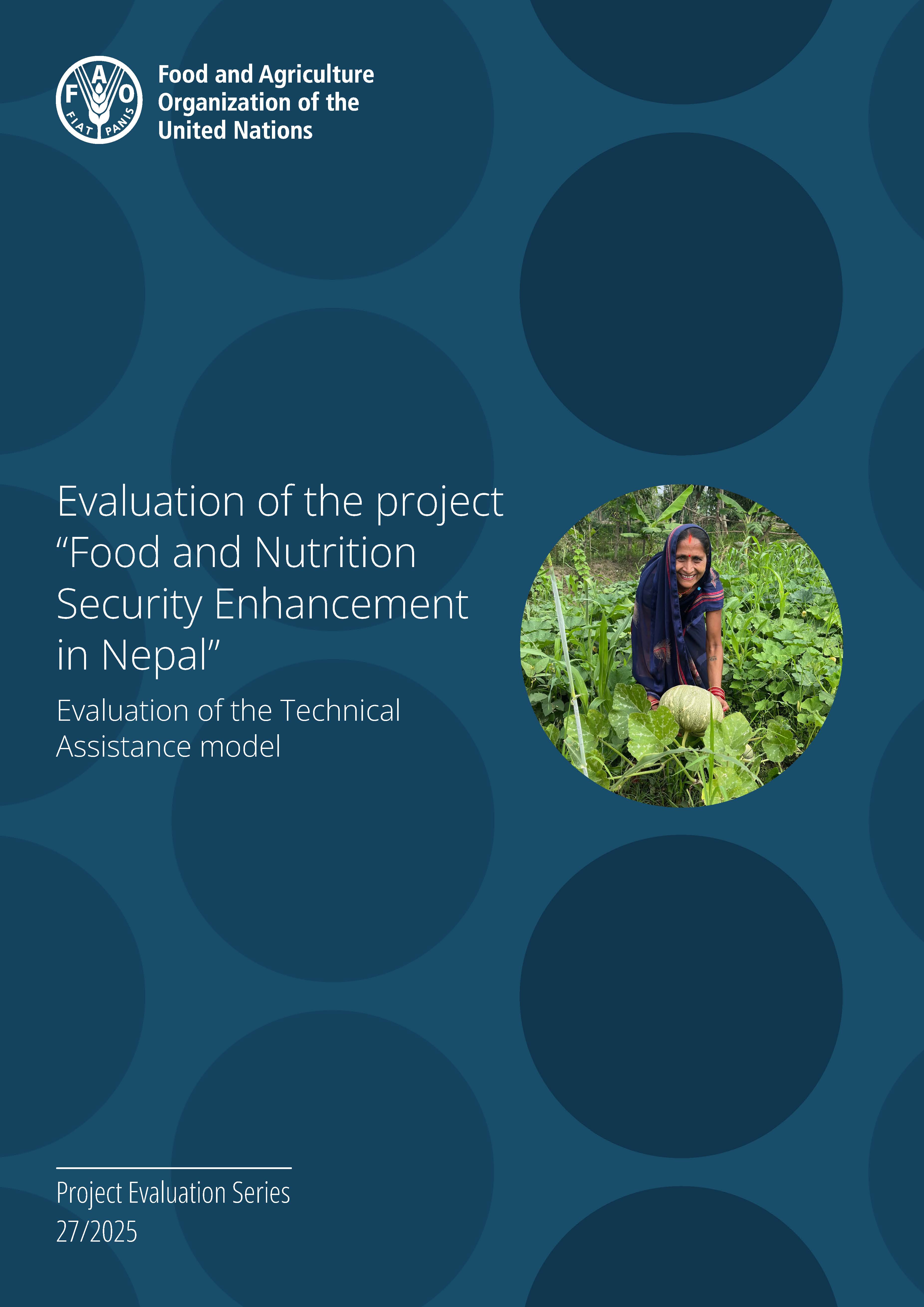Completed evaluations

Learning from evaluations of FAO's work in Africa 2022–2025 – Evaluation sysnthesis
02/03/2026
This synthesis draws on 58 evaluations conducted by the FAO Office of Evaluation in Africa between 2022 and 2025, complemented by a portfolio analysis of 1 201 FAO projects launched in the Africa region in the last four years, to inform strategic learning and future programming.

Evaluation of the project "Increasing capacities and scale for anticipatory action including through social protection systems"
26/02/2026
The final evaluation of this project reviewed a three-year FAO-DG ECHO partnership (2021–2024) that aimed to integrate anticipatory action (AA) with social protection (SP) systems in Bangladesh, Lao People's Democratic Republic, Pakistan, the Philippines, and Viet Nam. The evaluation concludes that the project laid a strong foundation for future initiatives, demonstrating AA’s potential to reduce reliance on emergency aid and support policy change.

Terminal evaluation of the project "Contributing to Land Degradation Neutrality Target Setting by Demonstrating the Land Degradation Neutrality Approach"
02/02/2026
The evaluation, conducted from September 2024 to March 2025, assessed performance against the following evaluation criteria: relevance, coherence, efficiency, effectiveness, sustainability and application of GEF policies and guidelines. The evaluation found the project highly relevant, coherent, and sustainable, offering a replicable model that connects science-based planning with inclusive land management.

Evaluation of the project "Mexico - CARICOM - FAO Initiative, Cooperation for Adaptation and Resilience to Climate Change in the Caribbean"
02/02/2026
The evaluation concluded that the project fostered essential conditions leading to small-scale early improvements and successfully facilitating access to climate and environmental finance. The recommendations focused in four areas: consolidation of successful project experiences; strengthening capacity assessment and monitoring; increased attention on vulnerable groups; and robust knowledge management in resilience and subregional projects.

Cluster evaluation of FAO resilience activities in Yemen 2018–2024
23/01/2026
The evaluation examined FAO’s contributions in four thematic areas: natural resources management, agriculture, livestock and governance, within the framework of the humanitarian–development–peace nexus. The primary users of the evaluation are the FAO Yemen Country Office, the Government of Yemen, the Sana’a-based authorities, FAO regional and headquarters divisions, as well as resource partners, implementing partners, and other humanitarian and development actors in Yemen.

Evaluation of FAO’s work in South Sudan 2016–2023
30/12/2025
FAO is well positioned to play a more strategic role across the HDP nexus in South Sudan, given its technical mandate, field presence and partnerships. It recommends accelerating the shift toward resilience and cash-based approaches; mainstreaming conflict sensitivity; strengthening needs-based targeting; developing longer-term partnerships; better leveraging FAO’s corporate technical expertise; and using monitoring and evaluation more systematically to support learning and programme adaptation.

Programme assessment of FAO’s Ukraine emergency response (2022–2024)
21/11/2025
Addressing the strong needs of the FAO Country Office in Ukraine to have feedback and a report that could inform their planning for 2025, this programme assessment is a targeted exercise from the FAO Office of Evaluation. The programme assessment sought to answer two key questions: i) What have been the results of FAO’s emergency work? ii) What are the key lessons that can feed into FAO Ukraine’s upcoming multiyear programme and any future surge responses?

Evaluation of the project "Support for self-employment of rural youth, a vector of peace and social cohesion in Mali"
20/11/2025
The project proposed and successfully tested concrete models and approaches that addressed the needs of the direct beneficiaries and the objective of conflict prevention. It successfully deployed the "learning by doing" approach to involve stakeholders well-established in the intervention area. However, its effectiveness and impact were limited by clearly identified internal and external constraints, which should be taken into account in future similar interventions. Available only in French.

Evaluation of the project "Food and Nutrition Security Enhancement in Nepal" - Evaluation of the Technical Assistance model
20/11/2025
There were some constraints in fragmented coordination and limited integration with local governance structures, affecting sustainability potential. Recommendations were made for similar future investments which focused on stronger integration with Local Governance Structures; improvements in operational efficiency and responsiveness; and better incorporation of inclusion and sustainability mechanisms.

Terminal evaluation of the Coastal Fisheries Initiative project "Delivering Sustainable Environmental, Social and Economic Benefits in West Africa through Good Governance, Correct incentives and Innovation"
23/10/2025
The evaluation concluded that the project was relevant and technically sound, with strong stakeholder buy-in. Recommendations include improving gender mainstreaming, anticipating environmental impacts, and strengthening financial planning and monitoring. This evaluation aims to inform policymakers, donors, and practitioners working in the field of sustainable fisheries and inclusive development.
